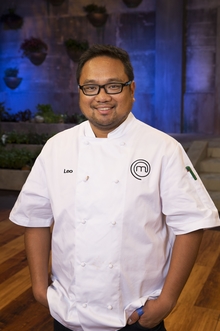Sticking to his Filipino roots might have cost him the title. At the Masterchef New Zealand 2015 Finale, Filipino born and raised Leo Fernandez, upon receiving the challenge brief, headed straight to the pantry with a plan. In two hours, he and his opponent were to create three dishes: one street food, one comfort food and one fine dining dish. Leo, known for his bubbly, humble personality and for singing and speaking to himself on the show for stress relief, set out to remain true to himself. As he did week after week, he was presenting Filipino food – again.

Tim Read vs Leo Fernandez (Photo Credit: Fresh.co.nz)
He did chicken in three ways: chicken steamed bun, chicken arroz caldo and chicken inasal. The latter two caused him his downfall. Compared to his opponent’s more mainstream dishes of roast chicken and roast lamb rack, the judges were underwhelmed by Leo’s comfort and fine dining dishes. Leo ended the runner-up. He may not have won the title, but he has won in more ways than one.

Leo’s Chicken Steamed Bun (Photo Credit: TV3.co.nz)
After MasterChef, Leo returned to Canterbury, New Zealand to resume his job as a pig farmer. Yet, showcasing Filipino food for the first time to Kiwis on national TV got people talking about the unknown cuisine. At an interview with Radio New Zealand months after the show, Leo spoke about unique Filipino dishes, such as the protein-rich “Camaro” or fried crickets and offal-based “Dinuguan” or pork blood stew.
Doors continued to open. Leo has now officially moved to Auckland and is busy making preparations for the opening of AZON, a Filipino-inspired restaurant in the “heart” of the country. More on the opening date, location and other details below.
MFB: Please tell us more about your Filipino heritage. What brought you to New Zealand?
LF: I lived in the small town of Laoac, Pangasinan where I spent most of my life, before immigrating to New Zealand. My father, Boy, is a native of that place and my mother, Nory, is from Lambunao, Ilo-ilo. I moved to New Zealand alone in July 2008 and lived here since. Just like everybody else, it was all about seeking opportunities where greener pastures were.
MFB: What did you do for a living before joining MasterChef. How did you get started in food/cooking?
LF: I was a registered and practicing veterinarian prior to leaving the Philippines. Upon arriving in New Zealand, I ended up working in the dairy sector before I shifted to pig farming for the last seven years.
I come from a family of good cooks and people who love eating. I never had the chance to really cook for the family since there was always somebody, either my mother, father or siblings, who would put their foot forward to cook. But then, I suppose food is in the blood. I always believe that food is comforting, especially the ones that we grew up liking and loving. So when I became a migrant worker, to relieve myself from homesickness and loneliness, I had to teach myself to cook. I reminisced and replicated the food I had watched the rest of my family cooked.
MFB: What motivated you to join MasterChef? What were the auditions like?
My friends motivated me to join MasterChef. I love to share and learn. I wasn’t as confident at first with my food because every person has his own preferences and taste. But part of learning is to be open to criticisms and comments from people who actually tried and tested one’s food.
Not all my friends were impressed with my style of cooking and so what better way to get affirmation that I could cook than MasterChef? That I wanted to highlight Filipino cuisine in New Zealand evolved from there.
The audition was nerve-racking. I applied online, got shortlisted, and then got through audition phase. Knowing that I would be amongst a pool of thousands of applicants was like “suntok sa buwan”, or shooting for the moon, so to speak.But I made it through and was humbled and relieved.
What was it like to be on the show? What was your favorite challenge? How did Masterchef change you as a person and a chef?

Catch of the Day Challenge (Photo credit: Stuff.co.nz)
It was so surreal. It was hard to believe. I liked the challenges and meeting other people who shared my passion for food.
My favorite was the semi-final challenge. We were asked to cook something that represented us. I chose the simple dish “bilo-bilo” or glutinous rice balls as it brought back memories of my childhood. It represented my past, my present and my future. I gave the dish my own spin and gave it a twist that I believed people from New Zealand and the world would appreciate. The dish was current, modern and relevant. It earned me a spot in the finals.
I am not a chef, but a cook. The show opened another door for me. From all sorts of career, from being a veterinarian, to dairy farmer to pig farmer, now I am becoming a real chef and restaurateur. The show didn’t change me as a person per se, but have directed me to again another prespective.
MFB: I read you introduced Filipino dishes week after week on Masterchef. Which ones were the judges’ favorites? Can you please describe how you modernized these favorite dishes?

Leo’s Filipino-style whole trevally escabeche on MasterChef NZ ( Photo Credit: tv3 nz)

Leo’s medley of clam in coconut milk broth (Photo Credit: tv3 nz)
LF: My “bilo-bilo” dish was my favorite. For me, I think those dishes I made on the show are modern. Even if I fused other flavor combinations, techniques and styles, the foundation or flavor profile is somewhat preserved. For example, I stuffed bilo-bilo with sweet potato puree then incorporated it with other ingredients and spices.

Another is maja Blanca (coconut pudding) with corn compote, toffee popcorn and lime.
I also presented binalot (derived from a Filipino word meaning “wrapped”) in a different way with a banana leaf cloche. The Filipino essence in these dishes was still there. I think the judges favorite was my audition signature dish which was the binalot. I think it was because it was what earned me my apron to get through the final 16.
MFB: About how many Filipinos are there in New Zealand ? Are there or had there been any establishments showcasing Filipino food in New Zealand ? Where does Filipino food stand in the NZ food scene What can be done to boost the popularity of Filipino food in New Zealand ?
LF:There are about 40,000 Filipinos residing in New Zealand. There are a handful of restaurants showcasing Filipino food, but the popularity compared to other Asian cuisines is a bit lagging behind. I think we need more restaurants and platforms like MasterChef to showcase Filipino food.
MFB: What do you think are the reasons for the absence or lack of Filipino food establishments in New Zealand?
LF: I think its the risk of putting up a business that you are introducing the unknown and unpopular to a somewhat homogenous market. I’m not saying that New Zealand is not adventurous to food, but people sometimes stick to what they are used to.
MFB:What are the chances of Filipino cuisine hitting the mainstream in New Zealand?
LF: There is a big chance. It’s just a matter of persistence and consistency. I think the New Zealand mainstream has somewhat gained more understanding of Filipino cuisine through MasterChef. I think more people are now wanting to try and see for themselves what Filipino cuisine is all about.
MFB: In the Masterchef finals, you made arroz caldo for the comfort food challenge. Aside from your Masterchef experience, what memories does arroz caldo stir up in you?
Arroz caldo sums up my memories of childhood back in the rural town where I grew up. Arroz caldo during birthdays, gatherings with friends, times when sick and merienda with the family. It brings back all the happy times of childhood that molded me to become who I am as an adult.
MFB:What are your plans in the next few years?
LF: I have just left the south island of New Zealand and am now officially living in Auckland. Together with partners, we are working in opening “AZON”, restaurant focusing on Filipino inspired cuisine in the mainstream of Auckland CBD.
 Auckland CBD (Photo credit: Wikimedia)
Auckland CBD (Photo credit: Wikimedia)
AZON is short for “corazon,” meaning heart in Spanish. It is a common name in the Philippines and happens to be the name of our investor’s mother. Also, we would like to reflect that the food will be cooked from the heart. It will be open in October or early November around Parnell area.
MFB: What advice can you give aspiring Filipino chefs in New Zealand ?
LF: Stick to your roots, and cook from your heart.
*Leo Fernandez is one of the contributing authors of our upcoming book, My Food Beginnings – a collection of Filipino food memoirs.
Connect with Leo Fernandez:
Bringing people together through food and stories.
Like us on Facebook / Follow us on Twitter.



Indeed Leo has become an inspiration of many Filipinos especially those who are in the cooking industry. Somehow his featuring Filipino food into the NZ limelight through Masterchef has added encouragement to my wife’s pursuing her opening a Filipino cafe in Timaru months after your stint in the show. Congratulations on your next venture Leo. Thank you MFB for this very informative and inspiring article.
LikeLiked by 1 person
Thank you for sharing such encouraging news. Congratulations to your wife on opening a Filipino Cafe! We wish her huge success and would love to interview her for our blog.
LikeLiked by 1 person
I am so proud of you doc Leo! Naming your Filipino Cafe “AZON” makes me doubly proud, thats my name with a heart! Congratulations for the new chapter of your life! GOD bless you always!
LikeLiked by 1 person
congrats bro,we wish your success what is the location im from Hamilton
LikeLiked by 1 person
Hi, Leo, so glad to see you join MasterChef and venturing on food business featuring Filipino cuisine. So proud of you ! (Tita Rosie Medina-Luna, LU)
LikeLiked by 1 person
Congratulations Leo. We are so proud of your success yet humbled by your attitude whatever challenges you’re taking on. You are a good person, friend who has a lot of love and care in whatever you do. I can’t wait to see where your food journey takes you. More power to you and sending you all the love from South Island.
LikeLiked by 1 person
Hi Kababayan,
Our family loves to eat out & we certainly look forward to visiting another Filipino-inspired resto in Auckland. Hoping you can keep food prices affordable to us, Pinoys, despite ur chosen location! Maraming Salamat….
LikeLike